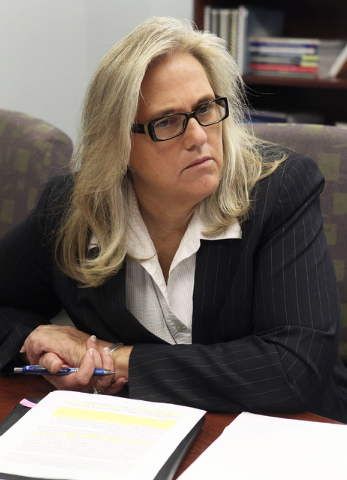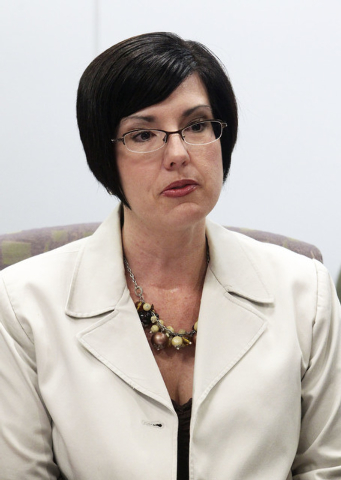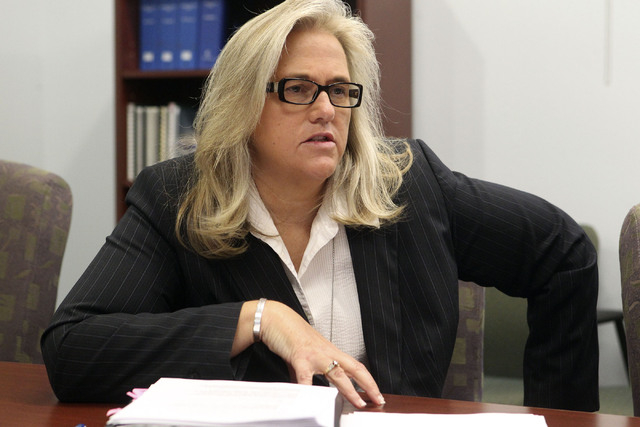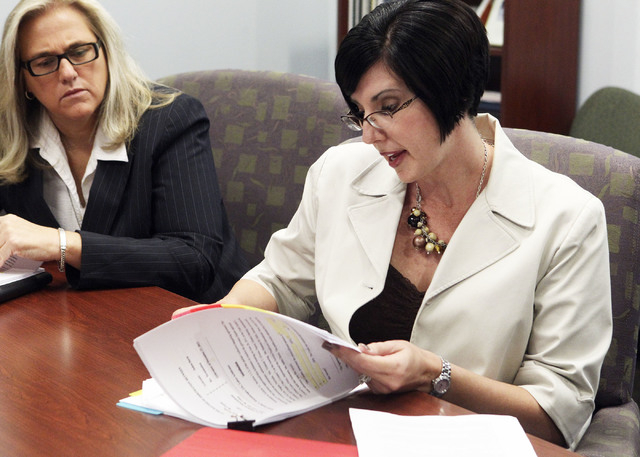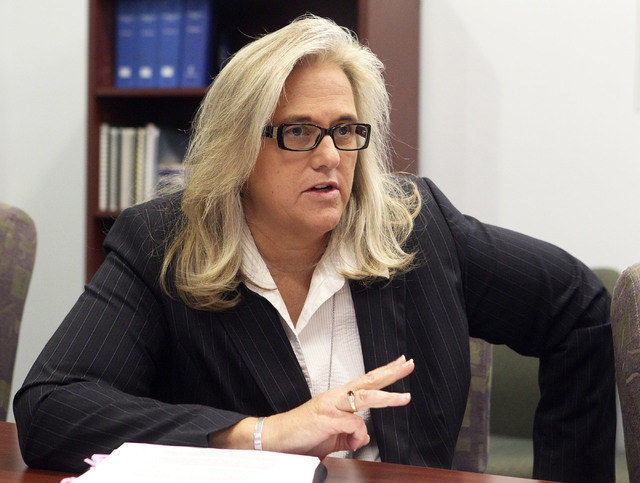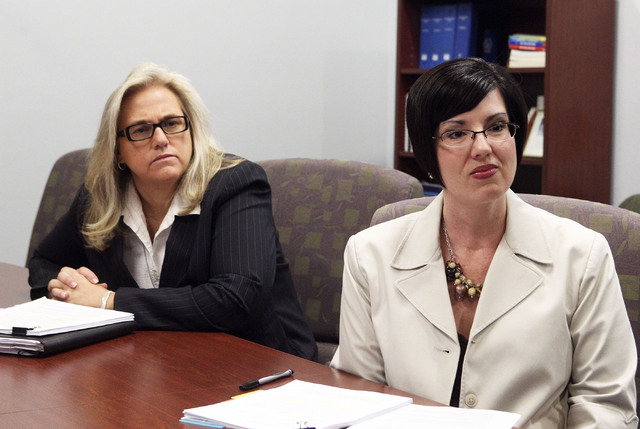County officials defend child abuse hotline policies criticized by arbitrator
An arbitrator’s ruling reinstating a fired Clark County Department of Family Services hotline worker found fault with the county’s policy for handling calls about possible child abuse.
However, county officials called the finding “incorrect,” saying the arbitrator’s Oct. 15 decision isn’t based on an understanding of child welfare practices. They maintain that Jadon Davis, whose termination sprang from a hotline call involving an abused child who later died, did not follow policy. They also say county policies adequately protect children, if followed properly.
Davis sees it differently.
“They know the kind of employee I was,” he said last week.
Davis had no history of formal discipline as a county employee prior to his firing. “I definitely feel like I was being made a scapegoat.”
Arbitrator Kathy Eisenmenger of Colorado found that Davis abided by county policies when handling a call on Nov. 28, 2012, from a Roundy Elementary School employee concerned about 7-year-old Roderick “RJ” Arrington Jr.
Less than 24 hours after that hotline call, which drew no immediate response from Child Protective Services because of the way it was prioritized, RJ was in a coma at University Medical Center. He died covered in bruises and with massive brain swelling. His stepfather and mother now face child abuse and murder charges.
At the heart of the case are questions about whether Davis acted appropriately when he deemed the call about RJ a Priority 2 case instead of assigning it the highest priority, which would have meant an almost immediate response.
The three-tiered system used by the Department of Family Services requires a caseworker to investigate calls based on the perceived danger to the child. Those with top priority get an investigator’s response within three hours. Priority 2 calls get a response within 24 hours. At the bottom are Priority 3 calls that require a response within 72 hours.
“The Hotline Policy’s guidance leaves a chasm between what conditions of child abuse or neglect present a Priority 1 situation and what constitutes a Priority 2 situation,” Eisenmenger wrote in her decision. “The Hotline Policy sets forth a yawning gap — either the situation is of such a severely dangerous nature that requires immediate intervention by CPS or law enforcement or the situation meets the guidelines for a Priority 3, 72-hour response. Every condition that does not fall within those two extremes is to be coded as Priority 2.”
County officials maintain that policy is not to blame and that the employee erred by failing to ask the caller enough questions and omitting crucial details in his report. The county says Davis should have discussed the call with a supervisor before classifying it as Priority 2.
Davis contended the policy doesn’t require that additional step.
Lisa Ruiz-Lee, director of the Clark County Department of Family Services, said officials believe their policies are sound. Their rules governing the hotline were developed and written by John Goad, the same expert who conducted an independent review of the agency in 2006 as it struggled with many systemic issues. The policies were implemented in 2008 and revised in 2011.
“I think that part of the struggle that any arbitrator would have, who does not have any child welfare expertise, is an understanding of the work that we do and understanding the training,” Ruiz-Lee said Friday. “I think one of the biggest mistakes that she makes in her interpretation of policy … is the fact that she uses the words ‘life-threatening.’ They are her words, not the policies’ words. She has inserted her own interpretation and her own assumption about a policy that she’s never had training on.”
The hotline policy is now up for routine review, but not as a result of the incident, Ruiz-Lee said.
The county’s child abuse hotline, 702-399-0081, is staffed 24 hours a day.
ONE HOTLINE, TWO CALLS
Twice on Nov. 28, 2012, the county’s hotline was called by an unidentified elementary school worker with concerns about Roderick’s well-being. The first call came in at 9:47 a.m. The second call came less than an hour later, records show.
The next day, at 8:03 a.m., Roderick’s mother, Dina Palmer, called 911 more than an hour after finding Roderick unresponsive in his bed.
At University Medical Center, doctors rushed Roderick to surgery to reduce his brain swelling. He also had fresh wounds on his buttocks and bruises on his arms, abdomen, back, legs and thighs, according to a Las Vegas police report.
Roderick’s mother and stepfather, Markiece Palmer, face child abuse and murder charges in connection with the case. Both refused to comment from the Clark County Detention Center.
The first call on Nov. 28, 2012, from the Roundy employee was taken by a different county hotline worker. The school worker relayed information from a neighbor of RJ’s family, according to the arbitration. Among the neighbor’s concerns were the sounds of crying, praying and “violence” at 4 a.m.
About 10:27 a.m. the same day, the hotline got a second call from the same school worker about RJ. Davis took it.
The school employee had talked to RJ, who walked as if he were in physical pain and had extensive scarring on his back, arbitration documents said.
RJ told the school worker he was beaten on the back and the butt with television cords, broom handles, spatulas and a belt when he got into trouble with his mother and stepfather. When beaten, his skin breaks and bleeds, he told the school employee.
The hotline caller didn’t want to look at the boy’s buttocks for signs of abuse, and asked for an investigator to respond, records show.
But after the school day ended at the elementary school, near Sahara Avenue and Lindell Road, RJ returned home and was beaten with a belt on his buttocks by his stepfather and mother, according to police reports.
The mother put cocoa butter on the open wounds. The boy went to bed after telling his mother he felt like he needed to throw up, according to the arrest report.
He never woke up.
DETERMINING PRIORITIES
Ruiz-Lee said Davis should have made the call Priority 1 because he had enough information to do so. Ruiz-Lee also said Davis failed to ask the right clarifying questions. Arbitration records show he omitted from his report the school worker’s statement that RJ said his skin falls off and bleeds when he is hit.
“The recommendation for the termination of this employee was made for many different reasons,” Ruiz-Lee said. “But at the core of all of those reasons for the termination, it was the fact that he did not follow policies.”
In an interview with the Review-Journal last week, Davis said he was relieved that the arbitrator saw the hotline policy as he did, that it is subjective.
There is a chance the same crisis will get three different responses, Davis said, depending on a hotline worker’s interpretation of the policy.
“You have different situations with each (call), and in some cases, like the case here, you’re dealing with limited information being reported to you,” he said.
Davis did ask for clarifying details from the school worker, and she wasn’t able to provide any, he said.
There also were no signs of current injuries, only scarring, Davis said. He used that as the basis to upgrade the call to Priority 2, he said.
Also, the child told the school employee he felt safe in going home.
Davis stressed that he had to make a decision based on the information that was available, not what came out afterward.
Davis also questioned whether the school employee pursued all avenues for helping RJ.
Melinda Malone, a spokeswoman for the Clark County School District, would not comment on the Roundy employee’s handling of the situation, citing pending litigation. The boy’s biological father, Roderick Arrington Sr., who lives in Illinois, is suing Clark County and the school district in his son’s death, based on the handling of the situation.
Malone said School District officials reviewed policies this year and created a training video for staff about their role as mandatory reporters.
Davis, who started working for the county in 2008, sold his Las Vegas home and now lives in the Portland, Ore., area, where he is looking for work and a fresh start.
Though officially cleared of violating policies, Davis still worries about finding work. When he applies for jobs, he includes a copy of the arbitrator’s finding. The ruling also requires the county to provide back pay, although the amount has not been released.
“At this point, I’ve got to cross my fingers,” Davis said.
Victor Vieth, executive director of the National Child Protection Training Center who has expertise in hotline policies, said most policies follow the same structure of priority levels as those in Clark County. Unfortunately, he said, most calls will fall somewhere in between the two extremes.
That is why hotline workers need to undergo rigorous training to be able to make the best assessment when faced with limited information,Vieth said.
“As a result, there will always be errors, a child will die,” he said. “We don’t really know the risk of the case until we investigate the case.”
Contact reporter Ben Botkin at bbotkin@reviewjournal.com or 702-387-2904. Follow him on Twitter @BenBotkin1. Contact reporter Yesenia Amaro at yamaro@reviewjournal.com or 702-383-0440.




